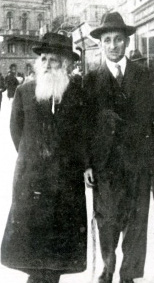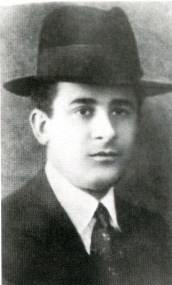Zolkiew Back Then
Excerpt from an article by Yosef Tzvi Buber: ” Zolkiew Back Then”:
“It is with a great sense of awe that I approach the writing of my earliest childhood memories in our city of Zolkiew, recording the impressions of my youth, the witness of my own eyes and ears, garnered from the leaders of the city, its notables, students of the learned ones and people of action, and out of the deepest sense of shock.
With trembling and holy angst I ask myself: where are your sons, Zolkva where are the wise men of the kloiz (synagogue) and batei midrash (study halls), your elders and sons, old and young, the wise men and intelligentzia of Jewry here, in this important town?
Fifty years ago, Shlomo Buber wrote in his book “Exalted town” – the story of the generations of Zolkiew elders. Who would have thought that, fifty years later, this treasured community would be destroyed totally, leaving no written document as testimony to its existence, except for this one book. Now, as wooden brands snatched from the flames residents in Zion, in coming to write a book in memory of their city, are helped by the book “Exalted town”, which serves as their guiding light.
Among those involved in the work of publishing the book was a descendant of the family of the man who wrote exalted town. At the turn of the previous century, Zolkiew was one of the most highly respected cities in Galicia. The greatest names in science and Torah study came from Zolkiew. Rabbis of international repute held court there, and in and by itself the honor accorded those who sat on the rabbinate in this important city was great indeed. The wise men of Zolkiew, men of distinguished linealogy, drew their learning and wisdom from the great men of the city, the fathers of enlightenment among Galician Jewry: Rabbi Gaon Tzvi Hirsch Hayut and the last Kolel sage, Rabbi Nachman Krochmal – and they are no more. The latter laid the scientific foundations for the doctrine of Jewish nationalism and contributed much to the ideological basis of Hibat Zion (the Love of Zion), before the appearance of Herzl’s Zionism.” End quote
Yosef Tzvi Buber, peace be upon him
Yosef Tzvi Buber of blessed memory, died on Shabbat. It seems to me that the day and month on which he died symbolize and hold within them the entire story of his life.
Throughout his lifetime, Yosef Tzvi Buber tried to transfer the glory of shabbat to the normal, profane days, to ennoble the tiring work days of the week with the beauty of shabbat. In the midst of his efforts and work to support his family he always found time to peruse a book, to learn and search through the scriptures, to reach the roots of the leaders of Israel and to wonder about the sources of popular expressions. And his free time was dedicated to the study of Torah, of wisdom and of the writings. The acrostic [in Hebrew] of the Hebrew month of Elul, in which he died – “I am my beloveds and my beloved is mine” – passed like a common thread through his life. He devoted much time and work to his fellow man in general as well as to individuals. Rabbi Yosef Tzvi Buber of blessed memory was one of the key figures of the Zolkiew & Mosty Wielki Communities Organization. The Galician city of Zolkiew was the city of his birth, this man who initiated and carried out most of the activities of the organization, bringing to Israel the ashes of most of Zollkiew’s saintly residents and erecting a monument. He invested much work in preparation of the book for which he himself wrote two comprehensive articles on the history of the community, its leaders, rabbis and key personalities. As mentioned, he was born in Zolkiew, which was dubbed the “exalted city”, and was the son of Rabbi Avraham, son of Rabbi Yosef Tzvi Halevi Buber, one of the notables of the city, of good family and great learning, and a relative of the researcher, editor and publisher of the midrashim of Rabbi Shlomo Buber and his grandson, the philosopher Martin Buber. On these rested his glory.
Yosef Tzvi Buber studied in the Beltzer kloiz in the city of Beltz, where he made a name for himself in Torah studies and chasidism. However, the news of chasidism penetrated through the slits in the walls of this “Fortress” [the Beltzer kloiz" was built to resemble a medieval fortress] and Yosef Tzvi “peeked and was smitten” and thereafter spread the word of the resurrected Eretz Israel, becoming one of the founders of the “Mizrachi” movement in his city. On moving to the city of Lvov he found shelter among the leaders of the movement, embracing Zionism yet never relinquishing his attachment to chasidism. And indeed, on his arrival in Israel, the realization of his ideal, he continued steadfastly down this path. When the Beltzer Rabbi reached Israel, from the midst of the Holocaust, Rabbi Yosef frequented the house of this, his confidant and mentor.
He loved Torah and those who studied it with a totally unrestricted love, and from out of this love he helped Rabbi Yonah Shtenzel of blessed memory to initiate the Mishna Yomit and Halacha Yomit, which became the “daily bread” of many Jews throughout the world. In addition to the Daf Hayomi (daily portion), he served as a member of the World Committee for Mishna Yomit, until his dying day.
Together with his late righteous, merciful and noble wife, Fani, peace be upon her, he was also a permanent representative of the Ponevezh Yeshiva and a personal friend of its founder, Rabbi Kahaneman of blessed memory.
From the most general to the particular, Rabbi Yosef Tzvi Buber showed good will and affection to every living human, brought people closer together, pursued peace and established peace and treated others with kindness, and indeed many were they who came early to his door, seeking advice, guidance and assistance, nor did he return them empty-handed. On his retirement from business, and especially after his wife, Fani, may she know peace, was taken from him, he devoted much of his time to the writing of his book, “The Anthology of Yosef”, on the parshot hashavua (weekly portions) and their haftarot. He lived to see its publication shortly before his death. He saw in this book, in which he collected precious pearls of wisdom from the writings of Isreal’s greatest sages on the Torah, and even added something of his own, his life’s crowning achievement. He dedicated the book to his deceased wife and presented a summary of his life in the preface.


